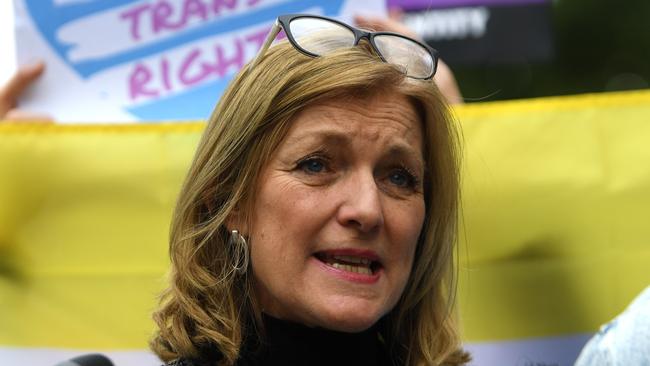Fiona Patten defends anti-vilification bill
Fiona Patten has hit back at free speech advocates who said her anti-vilification bill was ‘18c on steroids’.

Victorian upper house MP Fiona Patten has hit back at free speech advocates who say her amendment to Victoria’s Racial and Religious Tolerance Act is “18C on steroids”, arguing that free speech is not limited by a law which limits people’s rights to abuse and incite hatred.
Neither the government nor opposition has made a final decision on supporting the legislation when it goes before state parliament this week, but it is highly likely to pass should the Andrews government vote in favour.
Liberal Democrats MP David Limbrick and Institute of Public Affairs research fellow Morgan Begg last week warned of unintended consequences in the legislation, likening it to section 18C of the federal Racial Discrimination Act, which outlaws actions that “offend, insult, humiliate or intimidate” a person on the basis of their race.
Ms Patten said her proposed law was “quite different” to 18C, because it was an anti-vilification bill and not an anti-discrimination bill, meaning the “bar is a lot higher” to prove an offender guilty.
“It is cute to see that the IPA are still on their 18c crusade when the rest of the country has moved on,” Ms Patten said.
“The bill is an anti-vilification bill, vilification being public hate speech that principally threatens or incites hatred and violence against another person, or group of persons, based on who they are, not something they might have done, this being a much higher threshold of offending than discrimination.
“In my opinion limiting people’s right to abuse and incite hatred and violence is not limiting free speech. It is calling offensive and dangerous behaviour out.”
In her second reading speech, to be given this week, Ms Patten will argue that the law will protect women who have been subjected to sustained online abuse which has caused them to fear for their safety, citing the examples of opinion columnist Amy Gray, freelance sports reporter Erin Riley and ALFW footballer Tayla Harris, all of whom received online rape and death threats.
Ms Patten said the absence of her law had the effect of restricting free speech, because online trolls attacked women in order to silence them.
In response to Mr Begg’s warning that “each judge will have their own view on what is ‘likely to incite hatred’ or ‘severe ridicule’, leaving the law wide open to unintended consequences, Ms Patten said the bill replaced a law which stated that the offender “knows” their behaviour is “likely to incite serious contempt for, or revulsion or severe ridicule”.
“In changing the bill from ‘a person knew that it would incite’ to ‘likely incite’ this sets a more objective definition,” Ms Patten argued.
“The judge no longer has to go into the offender’s head and decide whether they knew or not.”
“David (Limbrick)’s comments that this is giving governments power to trawl through your internet history is absolute rubbish.
“This is a complaints-led process and one largely of mediation. It is not inquisitional.”
Mr Limbrick said Ms Patten had “unwittingly demonstrated” that the legislation was unnecessary, by giving “heart-wrenching examples of online abuse that are already covered by state and federal laws.”
“Federal laws exist to prosecute people using a carriage service to menace, harass or cause offence and our state law already prohibits conduct where an offender intends to cause physical or mental harm to the victim,” Mr Limbrick said.
“This legislation is brought to us by the same kind of virtue signallers who brought us the 18C — the political class who claim to care about diversity, but who want the lives of people with different opinions ruined.
“If you want to know how well that worked out, just ask those students from the Queensland University of Technology whose university years were ruined, or the complainant, who is now bankrupt.
“This legislation will create similar show trials, and generate the kind of debate that people like Fiona Patten were worried about during the same sex marriage referendum.
“It will also be unclear, for example, if women can have a genuine debate about new laws that affect transgender people.”
A spokesman for Attorney-General Jill Hennessy said the government was “considering Ms Patten’s proposal”.
“Hatred and prejudice have no place in our society and we must ensure that Victorians can go about their lives without fear of being vilified or harassed,” the spokesman said.
Coalition Citizenship and Multicultural Affairs spokesman Neil Angus said the opposition was yet to decide how it would vote on the bill.
“However, we do not support legislation that places unacceptable restrictions on the rights of Victorians to freely express themselves,” Mr Angus said.




To join the conversation, please log in. Don't have an account? Register
Join the conversation, you are commenting as Logout